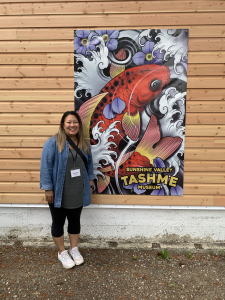Profile: Catherine Oikawa
Catherine Oikawa’s journey into Japanese Canadian (JC) history is both personal and professional. Born and raised in Canada, she grew up with a strong awareness of her heritage but only a fragmented understanding of her family’s wartime experiences. It wasn’t until she began her own research and engaged with the JC community that she started to uncover the complex history of internment, forced dispersal, and dispossession during the Second World War.
Her connection to this history is deeply rooted in her family’s experiences. Both of Catherine’s parents were born in Toronto, where her maternal and paternal grandparents had been forcibly relocated during the internment era. Like many in their generation, her grandparents rarely spoke about their experiences. It was through stories shared by great aunts and uncles, along with Catherine’s growing involvement in community history projects, that she began to understand the silences in her family’s past and their significance in the broader Japanese Canadian story.
As an educator, Catherine has dedicated her career to teaching. Working as a schoolteacher, she actively integrates social justice and historical awareness into her curriculum. Her passion for education extends beyond the classroom, as she engages younger generations in JC history through public history initiatives. She believes in making history accessible and meaningful, helping students connect personal narratives to broader historical injustices.
Catherine’s involvement with Past Wrongs, Future Choices (PWFC) began in 2021 when she attended the field school online due to the COVID-19 pandemic. While unable to visit historical sites in person, she immersed herself in archival research, discussions, and lectures that deepened her understanding of JC dispossession and its intergenerational impacts. The following year, she participated in the PWFC bus tour, which allowed her to physically visit key historical sites. She describes the experience as profoundly moving—standing in places where her own family and others endured hardships, she felt a tangible connection to the past that reinforced her commitment to historical memory. “It’s one thing to read about these places, but being there, seeing them, and listening to the stories shared on-site—that was life-changing,” she recalls.
Beyond her engagement with PWFC, Catherine remains active in JC community initiatives, recognizing their vital role in preserving and sharing this history. She sees the bus tour as an especially powerful educational tool, allowing participants to witness firsthand the places where historical injustices occurred and to engage with the stories of those affected. Her commitment to public history is driven by the belief that these narratives must continue to be told, not just for those directly connected to JC history but for all Canadians. “This history is Canadian history. It’s not just about one community—it’s about what happened in this country and what we can learn from it today,” she emphasizes.
Now, as she steps into the role of a field school instructor for PWFC, Catherine is eager to guide participants through the same transformative learning process she experienced. She emphasizes the importance of intergenerational dialogue, encouraging participants to engage with the lived experiences of survivors or/and descendants while also critically examining the broader implications of this history. “There is so much power in learning from those who lived through it, but also in recognizing the gaps in memory,” she reflects. “Understanding what was lost and how people coped is just as important as studying the policies themselves.”
Catherine’s work with PWFC aligns with her broader mission of making history accessible, relevant, and engaging. In a time when discussions of racism, displacement, and historical justice are more important than ever, she believes in using education as a means of fostering awareness and dialogue. Through research, teaching, and community engagement, she continues to bridge generations—ensuring that the lessons of the past remain a meaningful part of the present and future.
The article was written by Ciel Dong from an interview with Catherine Oikawa.

 Instagram
Instagram